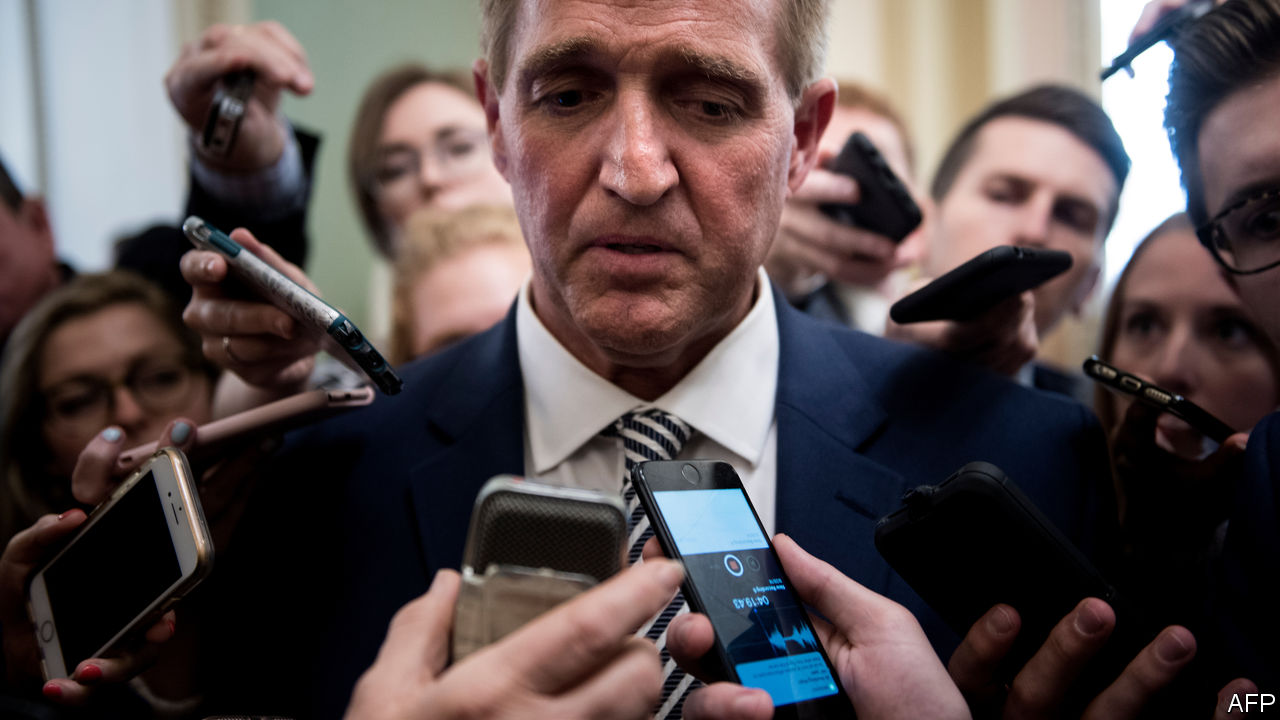
SENATOR Jeff Flake is a harsh critic of President Donald Trump. He also votes for the president’s agenda most of the time. On September 27th, one day after Christine Blasey Ford told the Senate Judiciary Committee that she was “100% certain” Brett Kavanaugh, Mr Trump’s pick for the Supreme Court, had sexually assaulted her when they were teenagers, Mr Flake said he would support Mr Kavanaugh’s bid for the Supreme Court. But a funny thing happened on the way to the chamber. Instead of joining his fellow 10 Republicans on the committee to send Mr Kavanaugh’s nomination to the floor, Mr Flake threw his colleagues a curveball. He would vote yes in committee, he said, but would not do so in a final full Senate vote unless the FBI reopened its background check into Mr Kavanaugh. Without further investigation into allegations that Mr Kavanaugh had assaulted Ms Blasey, Mr Flake could not support sending him to the Supreme Court.
What prompted Mr Flake’s change of heart? It may have been an interrupted elevator ride in the Capitol building. Two women who say they suffered sexual assault, Ana Maria Archila and Maria Gallagher, rushed to speak to Mr Flake when they saw him entering a lift. Ms Archila stuck her foot in the door, preventing him from closing it. “What you are doing is allowing someone who actually violated a woman to sit on the Supreme Court”, she cried. “I cannot imagine that for the next 50 years they will have to have someone in the Supreme Court who has been accused of violating a young girl. What are you doing, sir?” Ms Gallagher told Mr Flake she had been assaulted “and nobody believed me”. By supporting Mr Kavanaugh, she said, “you’re telling all the women that they don’t matter, that they should just stay quiet because if they tell you what happened to them you are going to ignore them” and “help that man to power anyway”.
Eyes downcast, Mr Flake said only “thank you” and “I have to go to the hearing”. But hours later he suggested he did not want to ignore these protestors. As senators waited inside the chamber, Mr Flake conferred furiously with Democrats, while anxious Republicans crowded around him. He then returned to the chamber, looking pained, to say that senators “ought to do what we can to make sure we do all due diligence with a nomination this important”. The way to prevent America from being ripped apart, he said, was a renewed investigation by the FBI, to be wrapped up in a week.
Senate Republican leaders, anxious to get Mr Kavanaugh robed before November’s mid-terms, had no choice but to agree to these terms. Mr Flake had recruited Senator Lisa Murkowski, a Republican moderate, to join his call for delay. Without these two votes in a Senate narrowly controlled by 51 Republicans to 49 Democrats, Mr Kavanaugh’s confirmation would fail. Later, Susan Collins, another potential Republican defector, called the proposal “sensible”.
Mr Trump also agreed to the Senate’s recommendation. Ms Blasey’s testimony was “very compelling”, he said, and senators “have to do what they think is right and be comfortable with themselves”. On the afternoon of September 28th he accepted the committee’s call for the FBI to get started investigating all “current credible accusations” against Mr Kavanaugh.
FBI agents are now springing to action, identifying and interviewing people who might shed more light on Ms Blasey’s charge that a drunk Mr Kavanaugh threw himself on top her, tried to remove her clothes and covered her mouth to stifle her screams at a high-school gathering in 1982. Those witnesses include Mark Judge, the man Ms Blasey says was in the room when his friend assaulted her, as well as Leland Keyser and P.J. Smyth, two contemporaries she says were downstairs during the attack. The FBI will also search for evidence to narrow the time and location horizons of the alleged incident. It is unclear whether or how extensively the agency will investigate two other accusations that have surfaced in recent days. Mr Kavanaugh denies all the accusations against him.
Ms Blasey’s lawyers welcomed the development but complained of “artificial limits” imposed on the investigation. That is a reasonable concern. The FBI may be able to complete its work by October 5th, but if it uncovers leads late in the week, it would be antithetical to the truth-finding goal of delaying the vote to say agents must cease in their investigations.
The report, whenever it comes, will not put an end to the rancour over whether Mr Kavanaugh should be confirmed. Nor, absent a major new finding, is it likely to imperil his nomination. The FBI will supply Mr Trump and the Judiciary Committee with interview transcripts and notes on how witnesses behaved; it is up to the senators how to analyse this data and piece it together. As their responses to the testimonies of Ms Blasey and Mr Kavanaugh showed, senators can hear evidence in very different ways. If Republicans are comfortable dismissing Ms Blasey’s wrenching and credible account of her alleged assault by Mr Kavanaugh on the basis of his furious yells and tears, more interview transcripts are not likely to sway them against him—especially as chances fade of confirming a different Supreme Court pick before the mid-terms.








